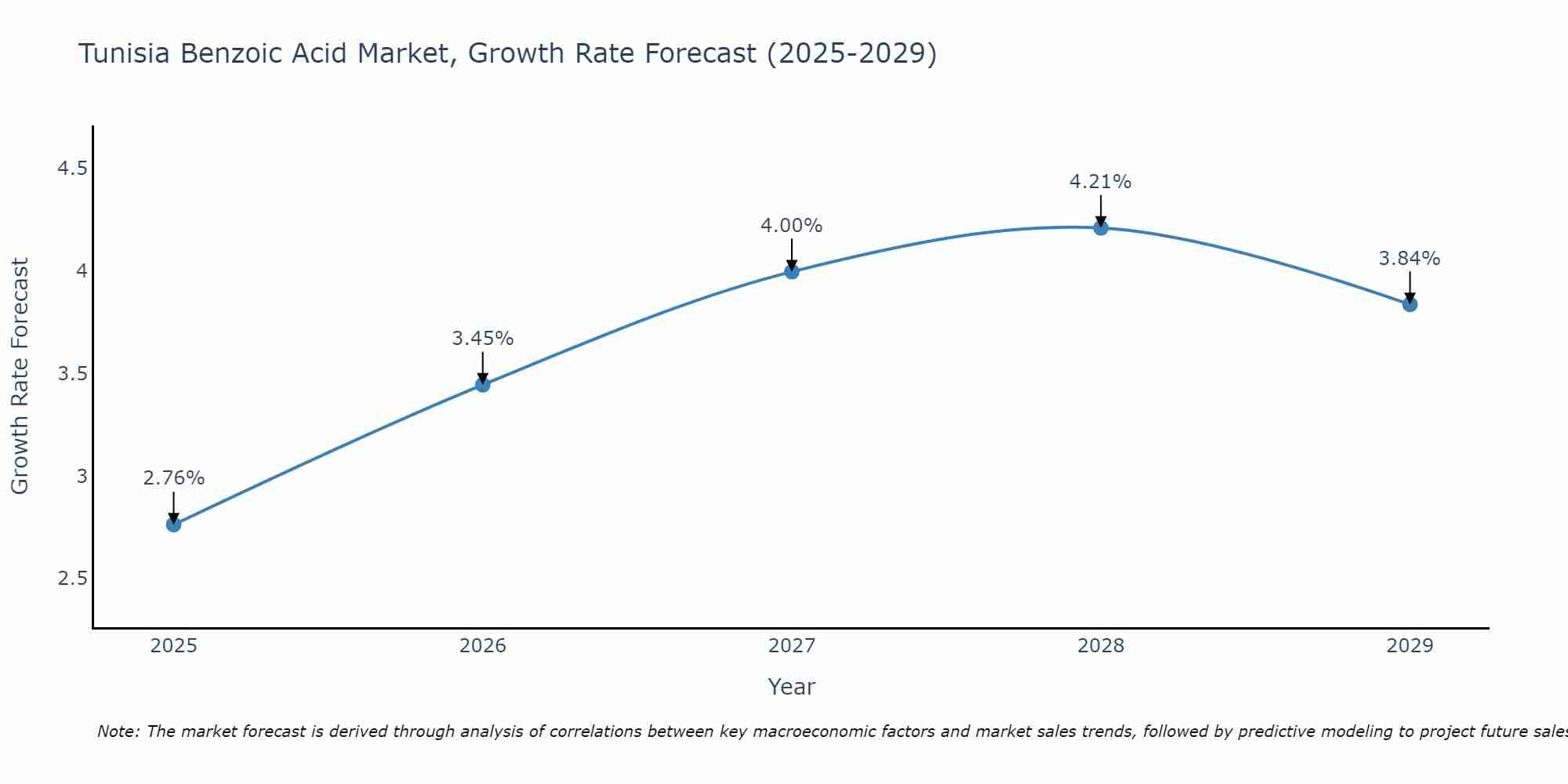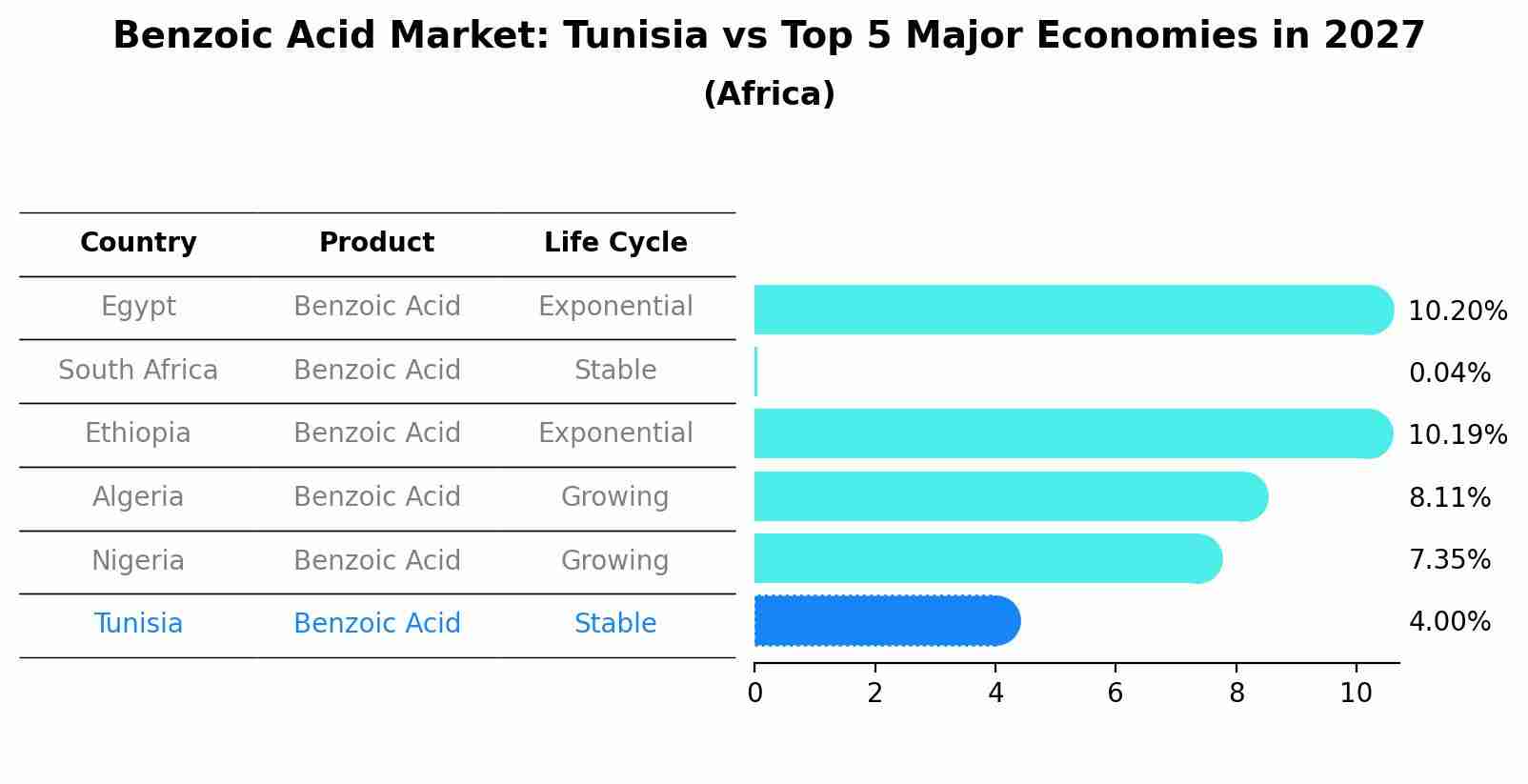Tunisia Benzoic Acid Market Outlook | Value, Revenue, Size, Analysis, Trends, Companies, Growth, Industry, Share, COVID-19 IMPACT & Forecast
| Product Code: ETC093673 | Publication Date: Jun 2021 | Updated Date: Jun 2025 | Product Type: Report | |
| Publisher: 6Wresearch | Author: Sumit Sagar | No. of Pages: 70 | No. of Figures: 35 | No. of Tables: 5 |
Tunisia Benzoic Acid Market Size Growth Rate
The Tunisia Benzoic Acid Market is projected to witness mixed growth rate patterns during 2025 to 2029. Growth accelerates to 4.21% in 2028, following an initial rate of 2.76%, before easing to 3.84% at the end of the period.

Benzoic Acid Market: Tunisia vs Top 5 Major Economies in 2027 (Africa)
The Benzoic Acid market in Tunisia is projected to grow at a stable growth rate of 4.00% by 2027, within the Africa region led by Egypt, along with other countries like South Africa, Ethiopia, Algeria and Nigeria, collectively shaping a dynamic and evolving market environment driven by innovation and increasing adoption of emerging technologies.

Tunisia Benzoic Acid Market Overview
The Tunisia Benzoic Acid market is experiencing steady growth due to the increasing demand from various end-use industries such as food and beverage, pharmaceuticals, and personal care products. Benzoic acid is widely used as a preservative in food and beverages to extend shelf life, in pharmaceuticals for its antifungal and antibacterial properties, and in personal care products for its fragrance-enhancing properties. The market is also driven by the growing trend towards natural and organic products, as benzoic acid is a naturally occurring compound found in many fruits. With the rising disposable income and changing lifestyle preferences in Tunisia, the demand for benzoic acid is expected to continue to rise, presenting opportunities for market players to expand their presence and offerings in the region.
Tunisia Benzoic Acid Market Trends
The Tunisia Benzoic Acid market is witnessing steady growth due to the increasing demand for the chemical compound in various industries such as food and beverage, pharmaceuticals, and personal care. The market is being driven by the rising use of benzoic acid as a preservative in food products and as an intermediate in the production of various chemicals. Additionally, the growing awareness regarding the benefits of benzoic acid, such as its antimicrobial properties and its role in extending the shelf life of products, is further fueling market growth. Key players in the Tunisia Benzoic Acid market are focusing on product innovation and expanding their distribution networks to capitalize on the growing demand. Overall, the market is expected to continue its positive trajectory in the coming years.
Tunisia Benzoic Acid Market Challenges
In the Tunisia Benzoic Acid Market, some challenges that are faced include fluctuating raw material prices, intense competition from imported products, and limited domestic production capacity. The volatility in raw material prices can impact the overall cost structure for local manufacturers, leading to difficulties in maintaining competitive pricing. Additionally, the presence of imported benzoic acid products from other countries can pose a threat to domestic producers, especially if the imported products are offered at lower prices. Furthermore, the limited production capacity within Tunisia may result in supply shortages or inability to meet growing demand, thereby hindering market growth and potentially causing customers to seek alternative sources for benzoic acid. Overall, addressing these challenges through strategic pricing, quality enhancement, and capacity expansion efforts will be crucial for the Tunisia Benzoic Acid Market to thrive.
Tunisia Benzoic Acid Market Investment Opportunities
The Tunisia Benzoic Acid market presents promising investment opportunities due to the growing demand for the product across various industries such as food and beverage, pharmaceuticals, and personal care. Benzoic acid is widely used as a preservative and flavoring agent in food products, as well as in the production of medications and cosmetics. With the increasing consumer awareness towards product quality and safety, the demand for benzoic acid is expected to rise steadily in the coming years. Investors can consider opportunities in manufacturing, distribution, and export of benzoic acid in Tunisia to capitalize on this growing market trend. Additionally, conducting market research on specific industry trends and regulatory requirements can help investors make informed decisions and maximize their returns in the Tunisia Benzoic Acid market.
Tunisia Benzoic Acid Market Government Policy
The Tunisian government has implemented policies to regulate the Benzoic Acid market, including quality standards, import and export regulations, and pricing controls. The Ministry of Health oversees the approval and monitoring of Benzoic Acid usage in food and beverages to ensure consumer safety. Additionally, the Ministry of Commerce enforces regulations on the import and export of Benzoic Acid to maintain market balance and prevent unfair trade practices. The government also sets price controls to prevent price gouging and ensure affordability for consumers. Overall, these policies aim to safeguard public health, promote fair trade practices, and stabilize the Benzoic Acid market in Tunisia.
Tunisia Benzoic Acid Market Future Outlook
The Tunisia Benzoic Acid market is expected to witness steady growth in the coming years driven by increasing demand from end-use industries such as food and beverage, pharmaceuticals, and personal care products. Factors such as the rising population, changing consumer preferences, and growing awareness about the benefits of benzoic acid are likely to contribute to the market expansion. Additionally, the focus on innovation and product development by key players in the region is anticipated to further propel market growth. However, challenges such as fluctuating raw material prices and regulatory constraints may hinder the market progression. Overall, the Tunisia Benzoic Acid market is poised for growth, with opportunities for market players to capitalize on the increasing demand and enhance their market presence through strategic initiatives.
Key Highlights of the Report:
- Tunisia Benzoic Acid Market Outlook
- Market Size of Tunisia Benzoic Acid Market, 2021
- Forecast of Tunisia Benzoic Acid Market, 2027
- Historical Data and Forecast of Tunisia Benzoic Acid Revenues & Volume for the Period 2018 - 2027
- Tunisia Benzoic Acid Market Trend Evolution
- Tunisia Benzoic Acid Market Drivers and Challenges
- Tunisia Benzoic Acid Price Trends
- Tunisia Benzoic Acid Porter's Five Forces
- Tunisia Benzoic Acid Industry Life Cycle
- Historical Data and Forecast of Tunisia Benzoic Acid Market Revenues & Volume By End-use Industry for the Period 2018 - 2027
- Historical Data and Forecast of Tunisia Benzoic Acid Market Revenues & Volume By Food & Beverages for the Period 2018 - 2027
- Historical Data and Forecast of Tunisia Benzoic Acid Market Revenues & Volume By Chemical for the Period 2018 - 2027
- Historical Data and Forecast of Tunisia Benzoic Acid Market Revenues & Volume By Pharmaceutical for the Period 2018 - 2027
- Historical Data and Forecast of Tunisia Benzoic Acid Market Revenues & Volume By Application for the Period 2018 - 2027
- Historical Data and Forecast of Tunisia Benzoic Acid Market Revenues & Volume By Benzoates for the Period 2018 - 2027
- Historical Data and Forecast of Tunisia Benzoic Acid Market Revenues & Volume By Benzoate plasticizers for the Period 2018 - 2027
- Historical Data and Forecast of Tunisia Benzoic Acid Market Revenues & Volume By Benzoyl Chloride for the Period 2018 - 2027
- Historical Data and Forecast of Tunisia Benzoic Acid Market Revenues & Volume By Alkyd Resins for the Period 2018 - 2027
- Historical Data and Forecast of Tunisia Benzoic Acid Market Revenues & Volume By Animal Feed Additive for the Period 2018 - 2027
- Tunisia Benzoic Acid Import Export Trade Statistics
- Market Opportunity Assessment By End-use Industry
- Market Opportunity Assessment By Application
- Tunisia Benzoic Acid Top Companies Market Share
- Tunisia Benzoic Acid Competitive Benchmarking By Technical and Operational Parameters
- Tunisia Benzoic Acid Company Profiles
- Tunisia Benzoic Acid Key Strategic Recommendations
Frequently Asked Questions About the Market Study (FAQs):
- Single User License$ 1,995
- Department License$ 2,400
- Site License$ 3,120
- Global License$ 3,795
Search
Thought Leadership and Analyst Meet
Our Clients
Related Reports
- Canada Oil and Gas Market (2026-2032) | Share, Segmentation, Value, Industry, Trends, Forecast, Analysis, Size & Revenue, Growth, Competitive Landscape, Outlook, Companies
- Germany Breakfast Food Market (2026-2032) | Industry, Share, Growth, Size, Companies, Value, Analysis, Revenue, Trends, Forecast & Outlook
- Australia Briquette Market (2025-2031) | Growth, Size, Revenue, Forecast, Analysis, Trends, Value, Share, Industry & Companies
- Vietnam System Integrator Market (2025-2031) | Size, Companies, Analysis, Industry, Value, Forecast, Growth, Trends, Revenue & Share
- ASEAN and Thailand Brain Health Supplements Market (2025-2031) | Strategy, Consumer Insights, Analysis, Investment Trends, Opportunities, Growth, Size, Share, Industry, Revenue, Segments, Value, Segmentation, Supply, Forecast, Restraints, Outlook, Competition, Drivers, Trends, Demand, Pricing Analysis, Competitive, Strategic Insights, Companies, Challenges
- ASEAN Bearings Market (2025-2031) | Strategy, Consumer Insights, Analysis, Investment Trends, Opportunities, Growth, Size, Share, Industry, Revenue, Segments, Value, Segmentation, Supply, Forecast, Restraints, Outlook, Competition, Drivers, Trends, Demand, Pricing Analysis, Competitive, Strategic Insights, Companies, Challenges
- Europe Flooring Market (2025-2031) | Outlook, Share, Industry, Trends, Forecast, Companies, Revenue, Size, Analysis, Growth & Value
- Saudi Arabia Manlift Market (2025-2031) | Outlook, Size, Growth, Trends, Companies, Industry, Revenue, Value, Share, Forecast & Analysis
- Uganda Excavator, Crane, and Wheel Loaders Market (2025-2031) | Strategy, Consumer Insights, Analysis, Investment Trends, Opportunities, Growth, Size, Share, Industry, Revenue, Segments, Value, Segmentation, Supply, Forecast, Restraints, Outlook, Competition, Drivers, Trends, Demand, Pricing Analysis, Competitive, Strategic Insights, Companies, Challenges
- Rwanda Excavator, Crane, and Wheel Loaders Market (2025-2031) | Strategy, Consumer Insights, Analysis, Investment Trends, Opportunities, Growth, Size, Share, Industry, Revenue, Segments, Value, Segmentation, Supply, Forecast, Restraints, Outlook, Competition, Drivers, Trends, Demand, Pricing Analysis, Competitive, Strategic Insights, Companies, Challenges
Industry Events and Analyst Meet
Whitepaper
- Middle East & Africa Commercial Security Market Click here to view more.
- Middle East & Africa Fire Safety Systems & Equipment Market Click here to view more.
- GCC Drone Market Click here to view more.
- Middle East Lighting Fixture Market Click here to view more.
- GCC Physical & Perimeter Security Market Click here to view more.
6WResearch In News
- Doha a strategic location for EV manufacturing hub: IPA Qatar
- Demand for luxury TVs surging in the GCC, says Samsung
- Empowering Growth: The Thriving Journey of Bangladesh’s Cable Industry
- Demand for luxury TVs surging in the GCC, says Samsung
- Video call with a traditional healer? Once unthinkable, it’s now common in South Africa
- Intelligent Buildings To Smooth GCC’s Path To Net Zero


















